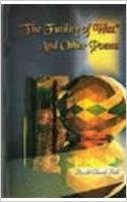
“The Futility of Wax” And Other Poems by Donald Edward Kidd, Cyberwit.net, India, 2004, pp. 80, $15, ISBN 81-8253-020-2
“The Futility of Wax” And Other Poems is a very distinguished production of verse by Kidd, a highly gifted poet. The poems reveal a strong depth, sincerity and sweetness, ‘the vitality of a hot dream’:
Amazon USA“The Futility of Wax” And Other Poems is a very distinguished production of verse by Kidd, a highly gifted poet. The poems reveal a strong depth, sincerity and sweetness, ‘the vitality of a hot dream’:
With your hair cut short
I can see the small mole
On the back of your neck.
You probably don’t even know
It’s there. But I do.
Funny how the little things
Are what we remember most.
It’s not the size that counts.
(“HAIRCUT”, p. 25 )
Kidd shows a variety of themes. “Leaking” describes that the poet is haunted by ghosts
(I am a haunted house \ Of ghosts and eerie creaking, p. 35). The title poem “The Futility Of Wax” has supreme lyric gift. The faultless ease of this poem devoid of any kind of pulpit pomposity is evident:
I tried to melt her
Like a wax figure, but
She is made of sterner stuff;
A new space age material
Impervious to heat and flame.
(“THE FUTILITY OF WAX”, p. 60)
Kidd shows his interest and hunger for the unknown, the invisible and the infinite, an unquenchable desire for ‘islands On a drifting sea’ (“Islands”), transcendental Love which neither befools nor leaves ‘warm blood an icy pool’ ( “Love” ), but the poet never indulges in romantic paraphernalia as he is very well aware of ‘Scars, upon scars, upon scars’ ( “Not Normally Meant” ) and ‘uncaring skies’ (“The Entertaining Lack” ), and there is nothing pessimistic in the whole range of Kidd’s poetry:
For this day, is old and stale,
While tomorrow’s wind, blows fresh and hale
(“Tomorrow’s Wind”, p. 73 )
Kidd is able to blend subtle complexity with epigrammatic force:
“Two of me wage war inside \ A constant battle of wits” (“Two Of Me”), “Desires are never really changed \ They’re merely slogans, rearranged” (“Tomorrow’s Wind”), “She was a really good apple, \ High up in the tree, out of reach” ( “The One Who Got Away”).
No doubt, in Kidd’s poetry we find a wonderful mixture of texture and technique. There are few poets more interesting than Kidd, and he is undoubtedly a powerful poet with a tilting charm and gracious music of his own.
